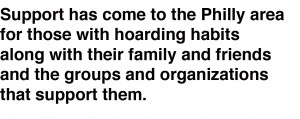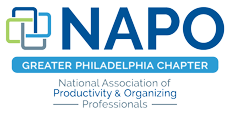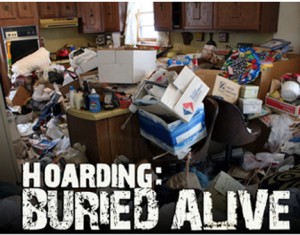
Along with four other Professional Organizers, I had the opportunity to attend a meeting of the Philadelphia Hoarding Task Force and was excited to find out that we are NOT ALONE!
The result of hoarding behaviors touches countless lives. The most obvious is the lives of those with hoarding habits, those who live with them, their children, family members, and close friends. Maybe, less obvious, is the effect of this life style on their surrounding communities. Often times there have been multiple attempts to deal with and support those with hoarding habits resulting in little change and outcomes that don’t last long. Interventions usually focus on having the person divest themselves of things that clutter their living spaces. Frustration, hard feelings are the typical results as little seems to penetrate the multifaceted web of commingled issues, emotions and unrelenting habits that have, more likely than not, spanned the individual’s life time.
This particular and persistent practice of collecting is the manifestation of a complex network of interpretations for the person who engages in hoarding behaviors. For many who are observing these hoarding tendencies, it is virtually impossible to understand, decipher, and make sense of the complexities involved in the condition. Working side by side with clients who engage in hoarding behaviors, I have heard very elaborate and creative explanations for their holding on to what looks like, to anyone else, seemingly useless items. Their ‘need’ to save things is logical in their view, however, the result of their logic is counterproductive to their desire to alleviate their situation that impacts themselves, their loved ones, and in some cases, their community.
Because the result of hoarding behaviors looks like disorganization and clutter, at first glance, it would seem like working with hoarding situations is perfectly suited for the organizing profession. Initially, that was the thinking of the pioneers of our profession until they began to notice that successful organizing methodologies, principles, and products did not seem to work with certain clients. During those early years, organizers tried to impact situations where shower rods became alternate hanging spaces for clothes, dining room tables became storage for piles of papers often flowing over to the accompanying chairs, and beds housed everything else leaving little to no room for the owner. The result, a sub group of NAPO was birthed. Back then it was called NSGCD (The National Study Group on Chronic Disorganization). Today, it is its own independent organization called The Institute for Challenging Disorganization (www.ChallengingDisorganization.org). Their mission is to provide education, research, and strategies to benefit people challenged by chronic disorganization.
Working with these situations for the past 11 years as well as being a member of NAPO and ICD, I have learned that simply talking about the ‘stuff’ with clients is limiting and often times futile. Getting to the reasons and explanations for their need to hold on to items helps to unlock the interpretation that justifies their hoarding behaviors and often times can loosen the grip of their ‘need’ to hold on to things. However, delving into the root cause of these tendencies is outside an organizer’s skill set and training. Teaming up with other professionals such as social workers and therapists, offers more hope for longer-lasting results.
Finding these opportunities to team up with other professionals working with people challenged with chronic disorganization has not been easy until recently when the Greater Philadelphia Chapter of NAPO (NAPO-GPC) was contacted and invited to participate on the Philadelphia Hoarding Task Force. An impressive list of local organizers accepted the invitation, and it was love at first meeting! Finally, we are NOT ALONE in our work with these clients!
Still in its infancy, the mission of the Philadelphia Hoarding Task Force, co-chaired by David Wengert from the Community Legal Services and Katherine Martin, Deputy Policy Director from the Mayor’s office, is to “ensure positive outcomes for those individuals who are impacted by hoarding.” Although the Task Force does not provide direct services, its role is to ensure access to resources, training for provider organizations, and education about hoarding in Greater Philadelphia”. The meeting that I attended with four of my collogues was comprised of representatives from the Philadelphia Police and Fire Department, Licenses & Inspections, Philadelphia Corporation for Aging, and Clutterers Anonymous, to name a few. Each of the representatives brought their unique perspective to the meeting. The shared conclusions was that the work of the Task Force should focus on the individual, not the problem, i.e. the ‘stuff’ and that this perspective should permeate all efforts made by the Task Force, especially in the educational trainings it provides.
A shared understanding of the complexity that leads to hoarding behaviors among the organizations that confront these circumstances, along with sharing resources, expertise, accountabilities, and services, was music to all of our ears!
Finally, we as organizers, can say, we are NOT ALONE in our work with clients who are struggling with habits of hoarding! Collaborating with other professionals helps us offer those challenged by hoarding habits a more holistic service approach, and a hopeful future.
Suggested Resources:
- Digging Out (Tompkins & Hartl)
- The Hoarding Handbook (Bratiotis, Schmalisch & Steketee)
- Compulsive Hoarding and Acquiring Workbook (Steketee & Frost)
- Stuff (Steketee & Frost)
- Buried in Treasures (Steketee, Tolin & Frost)
- The Secret Lives of Hoarders (Max Paxton)
- Conquering Chronic Disorganization (Judith Kolberg)
- Institute on Compulsive Hoarding & Cluttering
www.mentalhealthsf.org/programs/ichc - International OCD Foundation
www.ocfoundation.org/hoarding
- Children of Hoarders
www.childrenofhoarders.com
- The Institute for Challenging Disorder
www.ChallengingDisorganization.org
- Philadelphia Hoarding Task Force
Valerie King-Smith, PCA –
David Wengert, CLS –





